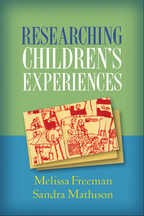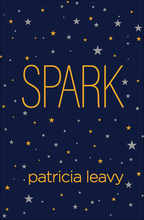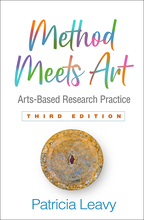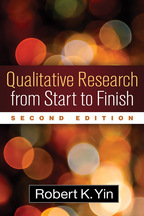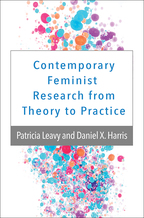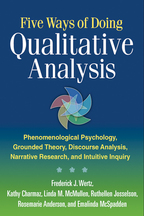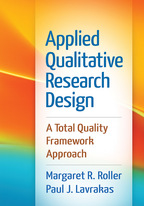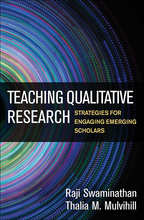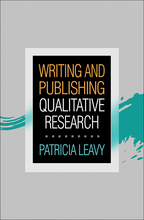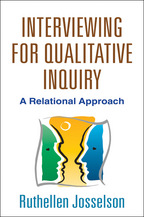Researching Children's Experiences
Melissa Freeman and Sandra Mathison
Paperback
Paperback
orderNovember 3, 2008
ISBN 9781593859954
Price: $43.00 196 Pages
Size: 6" x 9"
“Recommended reading for all potential or current researchers interested in conducting studies involving children and adolescents....I would promote the reading of this text for undergraduate and graduate students who are planning to pursue a career in child research....The questions could be used within a classroom setting or for a curious and engaged social science investigator.”

—Metapsychology Online Reviews
“Over the past decade, there has been increased interest in giving children a voice in decisions that affect their lives. Listening to children is the first step to enacting their rights. Espousing a social constructivist orientation, the authors present a variety of data collection methods that facilitate hearing children's ideas and perspectives. This practical guide will enhance researchers' ability to engage in collaborative research relationships with children. Highly recommended!”

—Charles E. Schaefer, PhD, RPT-S, Department of Psychology (Emeritus), Fairleigh Dickinson University
“Clinical practitioners looking for guidance in formulating and carrying out research that is child centered and child friendly will welcome this book, which is rooted in the authors’ social constructionist philosophy. All the necessary steps in conducting research are concisely detailed, from obtaining institutional review board approval to data analysis. The book is unique in its emphases on the child’s perspective and on ethical issues, and in its incorporation of diverse ways of eliciting children’s experiences. Researching Children’s Experiences makes young people part of the process and gives them an active voice in portraying their world.”

—Nancy Boyd Webb, DSW, LICSW, RPT-S, Distinguished Professor Emerita, Fordham University Graduate School of Social Service
“I didn’t expect that this well-written, exciting book would be so immediately relevant to my own research with children. Freeman and Mathison offer a very rich and pragmatic examination of children’s roles as research participants. They carefully describe research practices that acknowledge children’s competence and permit them to make informed, uncoerced choices about research participation. The anecdotes drawn from the authors' research are illuminating and will make it easy for readers to recognize their own experiences in the discussions. This book will be particularly useful for the graduate students in my research seminar. It will prompt them to thoughtfully reflect on their interactions with children and to design empirical studies that are sensitive to children’s perspectives and that capture children’s understanding. Highly recommended.”

—Beth Doll, PhD, Professor and Director, School Psychology Program, University of Nebraska-Lincoln
“Working with children in a research project is different from working with adults. This book peels back the layers to help the reader understand what the differences are and how to respond to children in highly ethical ways. The authors make the research process very transparent by contextualizing the steps needed to plan, carry out, and analyze a research project. They do an excellent job of connecting theory with the practice of qualitative research. Readers are put right into the action through the use of reflection and description. The authors examine their own experience from many different angles, weaving together the emotional and practical aspects of doing research.”

—Sara McCormick Davis, EdD, Early Childhood Education Program, University of Arkansas, Fort Smith
“What I like about this book is the use of lots of specific examples of fieldwork, both from the authors and from other researchers. The end-of-chapter discussion questions are fabulous.”

—Beth Graue, PhD, Department of Curriculum and Instruction, University of Wisconsin-Madison
“This book offers a refreshingly critical approach to research with children and youth that is certainly warranted. Some of the content is very thought provoking and challenges the traditional research paradigm.”

—Abigail M. Jewkes, PhD, Department of Teacher Education, Saginaw Valley State University
—Metapsychology Online Reviews
“Over the past decade, there has been increased interest in giving children a voice in decisions that affect their lives. Listening to children is the first step to enacting their rights. Espousing a social constructivist orientation, the authors present a variety of data collection methods that facilitate hearing children's ideas and perspectives. This practical guide will enhance researchers' ability to engage in collaborative research relationships with children. Highly recommended!”
—Charles E. Schaefer, PhD, RPT-S, Department of Psychology (Emeritus), Fairleigh Dickinson University
“Clinical practitioners looking for guidance in formulating and carrying out research that is child centered and child friendly will welcome this book, which is rooted in the authors’ social constructionist philosophy. All the necessary steps in conducting research are concisely detailed, from obtaining institutional review board approval to data analysis. The book is unique in its emphases on the child’s perspective and on ethical issues, and in its incorporation of diverse ways of eliciting children’s experiences. Researching Children’s Experiences makes young people part of the process and gives them an active voice in portraying their world.”
—Nancy Boyd Webb, DSW, LICSW, RPT-S, Distinguished Professor Emerita, Fordham University Graduate School of Social Service
“I didn’t expect that this well-written, exciting book would be so immediately relevant to my own research with children. Freeman and Mathison offer a very rich and pragmatic examination of children’s roles as research participants. They carefully describe research practices that acknowledge children’s competence and permit them to make informed, uncoerced choices about research participation. The anecdotes drawn from the authors' research are illuminating and will make it easy for readers to recognize their own experiences in the discussions. This book will be particularly useful for the graduate students in my research seminar. It will prompt them to thoughtfully reflect on their interactions with children and to design empirical studies that are sensitive to children’s perspectives and that capture children’s understanding. Highly recommended.”
—Beth Doll, PhD, Professor and Director, School Psychology Program, University of Nebraska-Lincoln
“Working with children in a research project is different from working with adults. This book peels back the layers to help the reader understand what the differences are and how to respond to children in highly ethical ways. The authors make the research process very transparent by contextualizing the steps needed to plan, carry out, and analyze a research project. They do an excellent job of connecting theory with the practice of qualitative research. Readers are put right into the action through the use of reflection and description. The authors examine their own experience from many different angles, weaving together the emotional and practical aspects of doing research.”
—Sara McCormick Davis, EdD, Early Childhood Education Program, University of Arkansas, Fort Smith
“What I like about this book is the use of lots of specific examples of fieldwork, both from the authors and from other researchers. The end-of-chapter discussion questions are fabulous.”
—Beth Graue, PhD, Department of Curriculum and Instruction, University of Wisconsin-Madison
“This book offers a refreshingly critical approach to research with children and youth that is certainly warranted. Some of the content is very thought provoking and challenges the traditional research paradigm.”
—Abigail M. Jewkes, PhD, Department of Teacher Education, Saginaw Valley State University

